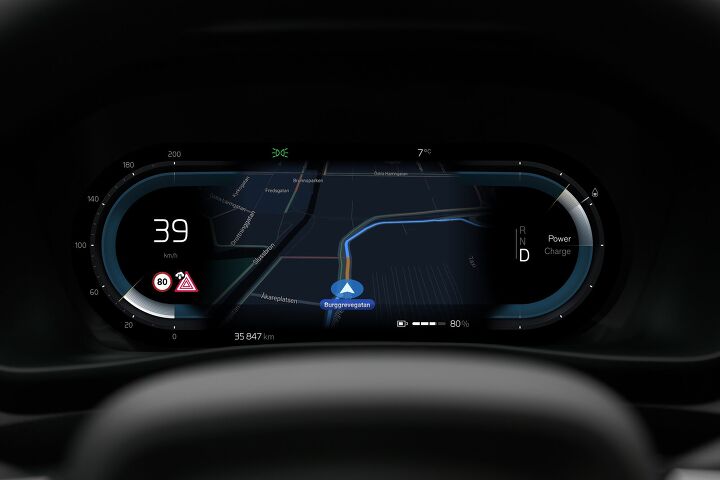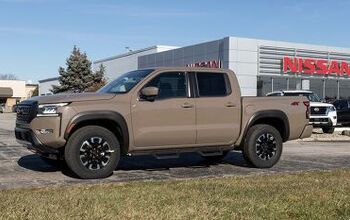Yay or Nay? Volvo Launches Accident Ahead Alert Service

Volvo is introducing a new feature that alerts drivers of accidents reported on the road ahead. With similar services available for free on select phone apps, many of which can be integrated with your vehicle’s infotainment display, Volvo’s offering doesn’t sound incredibly novel on its face. But it’s leveraging real-time data from government-operated traffic management centers via the automobile’s proprietary user interface, technically making the feature the first of its kind within the automotive industry.
Due to Volvo's Accident Ahead Alert service requiring the vehicle to communicate with a national traffic management hub, it’s presently only available in Denmark. However, the plan is to expand the feature to encompass the whole of Europe and incorporate additional data via partnering with the European Data for Road Safety ecosystem. This is in tandem with allowing connected Volvo products to communicate information with each other.
“We’re happy that Volvo Cars as the first car maker has started using our new real-time traffic event data feed,” Stine Bendsen, head of the Danish Traffic Management Centre at the Danish Road Directorate, said as part of the release. “A quick alert about an accident ahead gives the driver more time to slow down and increase the distance to the car in front. This helps to lower the risk of follow-up collisions and protect the people working to clear the road.”
This is very true. But we already have ways of doing this with arguably better accuracy. Most of the big tech companies have navigation applications that incorporate accident warnings that are usually submitted by other people that are currently traveling on the road. This would presumably offer more frequent data points than having to rely entirely on connected Volvos and government traffic hubs — depending on how the latter party monitors their roads.
In the event of a horrible wreck having taken place on a stretch of highway covered by loads of traffic cams, those traffic hubs are probably the first to know and likely to have more comprehensive details than any passerby. But it could be some time before the government is alerted to an accident on a less populated roadway and then manages to input the information that then has to be relayed to your car. Granted, it’ll still be happening quickly and digitally. But the same can be said of something like Waze, Google or Apple Maps.
Another big question is what else is Accident Ahead Alert going to offer? Many navigation applications will often warn drivers of impending speed traps, helping them avoid tickets. What are the odds those traffic enforcement centers are going to be telling Volvo where every police vehicle with a speed detector is going to be posted?
This is certainly a nice service to have. It’s just one that many of us have already. Likewise requiring cars to be networked to a government database is probably going to steer some people away from the brand. But most customers won’t be aware how the system works, let alone be bothered enough to give it a second thought.
Volvo hasn’t officially called this a pilot program. But rolling it out in Denmark makes it seem like that’s probably the case. Assuming the company manages how to work data transfer with government data hubs — the vehicle-to-vehicle communications are already figured out — for the Danes, it should scale up to encompass the whole of Europe. From there, the company will presumably see if it can begin service for other Western markets.
[Image: Volvo]
Become a TTAC insider. Get the latest news, features, TTAC takes, and everything else that gets to the truth about cars first by subscribing to our newsletter.

A staunch consumer advocate tracking industry trends and regulation. Before joining TTAC, Matt spent a decade working for marketing and research firms based in NYC. Clients included several of the world’s largest automakers, global tire brands, and aftermarket part suppliers. Dissatisfied with the corporate world and resentful of having to wear suits everyday, he pivoted to writing about cars. Since then, that man has become an ardent supporter of the right-to-repair movement, been interviewed on the auto industry by national radio broadcasts, driven more rental cars than anyone ever should, participated in amateur rallying events, and received the requisite minimum training as sanctioned by the SCCA. Handy with a wrench, Matt grew up surrounded by Detroit auto workers and managed to get a pizza delivery job before he was legally eligible. He later found himself driving box trucks through Manhattan, guaranteeing future sympathy for actual truckers. He continues to conduct research pertaining to the automotive sector as an independent contractor and has since moved back to his native Michigan, closer to where the cars are born. A contrarian, Matt claims to prefer understeer — stating that front and all-wheel drive vehicles cater best to his driving style.
More by Matt Posky
Latest Car Reviews
Read moreLatest Product Reviews
Read moreRecent Comments
- Varezhka I have still yet to see a Malibu on the road that didn't have a rental sticker. So yeah, GM probably lost money on every one they sold but kept it to boost their CAFE numbers.I'm personally happy that I no longer have to dread being "upgraded" to a Maxima or a Malibu anymore. And thankfully Altima is also on its way out.
- Tassos Under incompetent, affirmative action hire Mary Barra, GM has been shooting itself in the foot on a daily basis.Whether the Malibu cancellation has been one of these shootings is NOT obvious at all.GM should be run as a PROFITABLE BUSINESS and NOT as an outfit that satisfies everybody and his mother in law's pet preferences.IF the Malibu was UNPROFITABLE, it SHOULD be canceled.More generally, if its SEGMENT is Unprofitable, and HALF the makers cancel their midsize sedans, not only will it lead to the SURVIVAL OF THE FITTEST ones, but the survivors will obviously be more profitable if the LOSERS were kept being produced and the SMALL PIE of midsize sedans would yield slim pickings for every participant.SO NO, I APPROVE of the demise of the unprofitable Malibu, and hope Nissan does the same to the Altima, Hyundai with the SOnata, Mazda with the Mazda 6, and as many others as it takes to make the REMAINING players, like the Excellent, sporty Accord and the Bulletproof Reliable, cheap to maintain CAMRY, more profitable and affordable.
- GregLocock Car companies can only really sell cars that people who are new car buyers will pay a profitable price for. As it turns out fewer and fewer new car buyers want sedans. Large sedans can be nice to drive, certainly, but the number of new car buyers (the only ones that matter in this discussion) are prepared to sacrifice steering and handling for more obvious things like passenger and cargo space, or even some attempt at off roading. We know US new car buyers don't really care about handling because they fell for FWD in large cars.
- Slavuta Why is everybody sweating? Like sedans? - go buy one. Better - 2. Let CRV/RAV rust on the dealer lot. I have 3 sedans on the driveway. My neighbor - 2. Neighbors on each of our other side - 8 SUVs.
- Theflyersfan With sedans, especially, I wonder how many of those sales are to rental fleets. With the exception of the Civic and Accord, there are still rows of sedans mixed in with the RAV4s at every airport rental lot. I doubt the breakdown in sales is publicly published, so who knows... GM isn't out of the sedan business - Cadillac exists and I can't believe I'm typing this but they are actually decent - and I think they are making a huge mistake, especially if there's an extended oil price hike (cough...Iran...cough) and people want smaller and hybrids. But if one is only tied to the quarterly shareholder reports and not trends and the big picture, bad decisions like this get made.


































Comments
Join the conversation
Good for the Danes.
So Waze but less